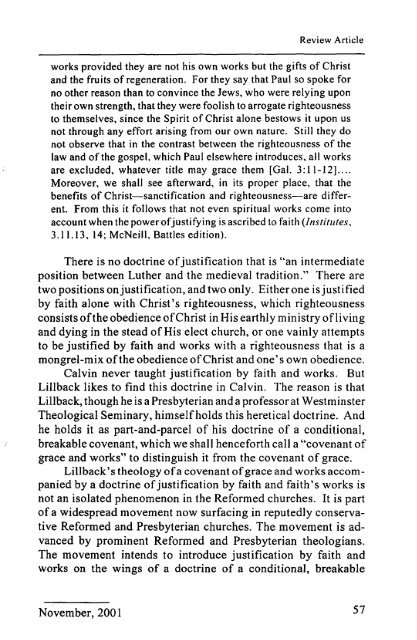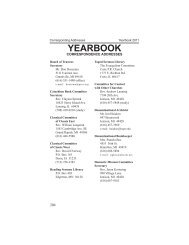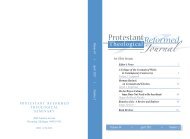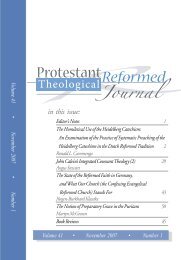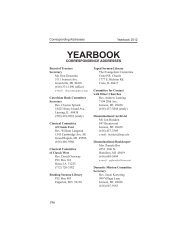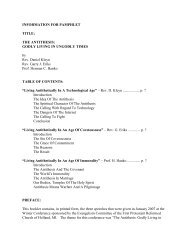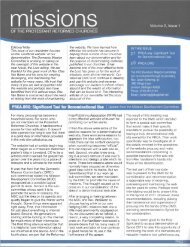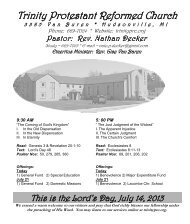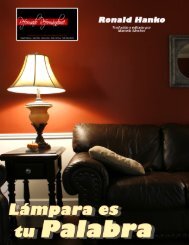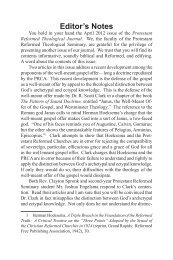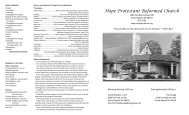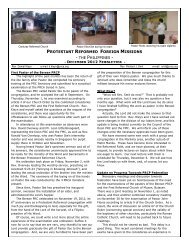pdf - Protestant Reformed Churches in America
pdf - Protestant Reformed Churches in America
pdf - Protestant Reformed Churches in America
You also want an ePaper? Increase the reach of your titles
YUMPU automatically turns print PDFs into web optimized ePapers that Google loves.
Review Articleworks provided they are not his own works but the gifts of Christand the fruits of regeneration. For they say that Paul so spoke forno other reason than to conv<strong>in</strong>ce the Jews, who were rely<strong>in</strong>g upontheir own strength, that they were fool ish to arrogate righteousnessto themselves, s<strong>in</strong>ce the Spirit of Christ alone bestows it upon usnot through any effort aris<strong>in</strong>g from our own nature. Still they donot observe that <strong>in</strong> the contrast between the righteousness of thelaw and of the gospel, which Paul elsewhere <strong>in</strong>troduces, all worksare excluded, whatever title may grace them [Gal. 3: 11-12]....Moreover, we shall see afterward, <strong>in</strong> its proper place, that thebenefits of Christ-sanctification and righteousness-are different.From this it follows that not even spiritual works come <strong>in</strong>toaccount when the powerofjustify<strong>in</strong>g is ascribed to faith (Institutes,3.11.13, 14~ McNeill, Battles edition).There is no doctr<strong>in</strong>e ofjustification that is "an <strong>in</strong>termediateposition between Luther and the medieval tradition." There aretwo positions onjustification, and two only. Eitherone isjustifiedby faith alone with Christ's righteousness, which righteousnessconsists ofthe obedience ofChrist <strong>in</strong> His earthly m<strong>in</strong>istry ofliv<strong>in</strong>gand dy<strong>in</strong>g <strong>in</strong> the stead of His elect church, or one va<strong>in</strong>ly attemptsto be justified by faith and works with a righteousness that is amongrel-mix ofthe obedience ofChrist and one's own obedience.Calv<strong>in</strong> never taught justification by faith and works. ButLillback likes to f<strong>in</strong>d this doctr<strong>in</strong>e <strong>in</strong> Calv<strong>in</strong>. The reason is thatLillback, though he is a Presbyterian anda professorat Westm<strong>in</strong>sterTheological Sem<strong>in</strong>ary, himselfholds this heretical doctr<strong>in</strong>e. Andhe holds it as part-and-parcel of his doctr<strong>in</strong>e of a conditional,breakable covenant, which we shall henceforth call a "covenant ofgrace and works" to dist<strong>in</strong>guish it from the covenant of grace.Lillback's theology ofa covenant ofgrace and works accompaniedby a doctr<strong>in</strong>e ofjustification by faith and faith'5 works isnot an isolated phenomenon <strong>in</strong> the <strong>Reformed</strong> churches. It is partofa widespread movement now surfac<strong>in</strong>g <strong>in</strong> reputedly conservative<strong>Reformed</strong> and Presbyterian churches. The movement is advancedby prom<strong>in</strong>ent <strong>Reformed</strong> and Presbyterian theologians.The movement <strong>in</strong>tends to <strong>in</strong>troduce justification by faith andworks on the w<strong>in</strong>gs of a doctr<strong>in</strong>e of a conditional, breakableNovember, 2001 57


